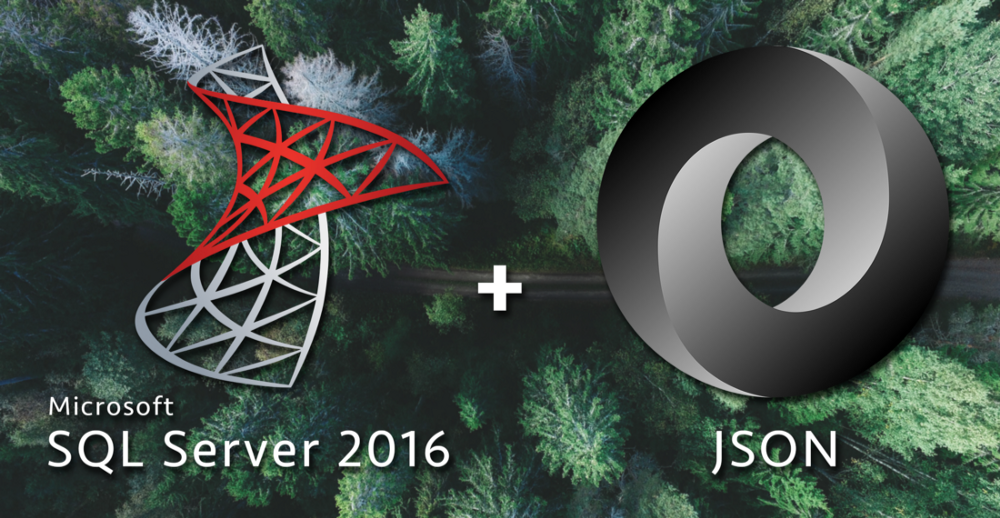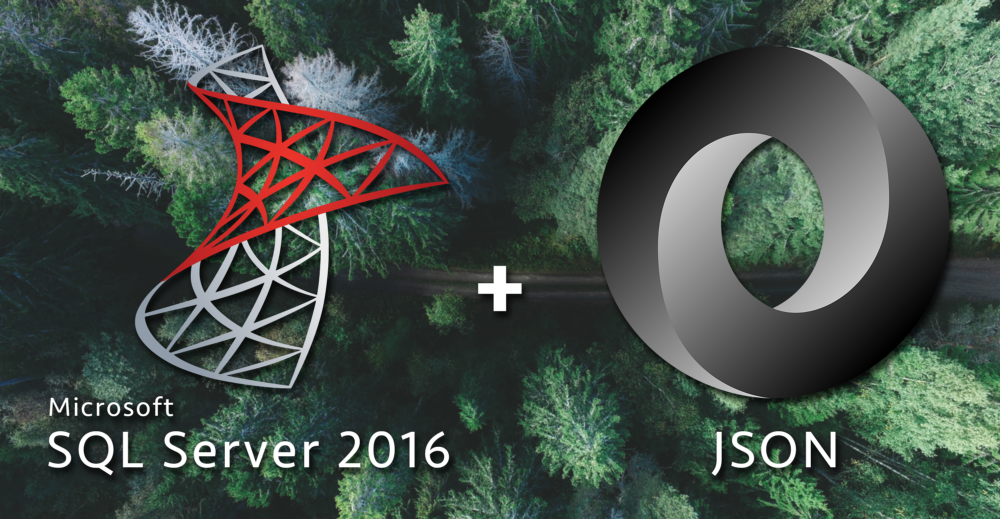
This is the second article in my series about learning how to use SQL Server 2016's new JSON functions. If you haven't already, you can read Part 1 — Parsing JSON.
- Part 1 — Parsing JSON
- Part 2 — Creating JSON
- Part 3 — Updating, Adding, and Deleting JSON
- Part 4 — JSON Performance Comparison
Last time we looked at SQL 2016's new functions for parsing JSON data. Today, I want to explore the different options available for creating JSON data from a SQL result set.
The first option we have for creating JSON is by hardcoding a SQL string value. This is a terribly painful way to creating JSON and doesn't use any of SQL 2016's new functionality. However, for the sake of completeness I thought it would good to highlight the obvious:
-- The most primative way of creating JSON in SQL. We don't want to have to do this
DECLARE @garage nvarchar(100) = '{ "Cars" : [{ "Make" : "Volkswagen"}, { "Make" : "Subaru"}] }'
-- But it works!
SELECT @garage
-- Output: { "Cars" : [{ "Make" : "Volkswagen"}, { "Make" : "Subaru"}] }
-- And with our SQL 2016 ISJSON() function we can check that the JSON string is valid
SELECT ISJSON(@garage)
-- Output: 1
Fortunately, SQL 2016 makes it much easier to generate JSON data from a query's result set. First, let's create some data to play around with:
-- Create our table with test data
DROP TABLE IF EXISTS ##Garage;
CREATE TABLE ##Garage
(
Id int IDENTITY(1,1),
Make varchar(100),
BaseModel varchar(50),
Trim varchar(50),
Year int,
PurchaseDate datetime2
);
INSERT INTO ##Garage VALUES ('Volkswagen', 'Golf', 'GL', 2003, '2006-10-05');
INSERT INTO ##Garage VALUES ('Subaru', 'Impreza', 'Premium', 2016, '2015-08-18');
-- Take a look at our data
SELECT * FROM ##Garage;
The data above should look pretty familiar from Part 1 of this series. It's only two rows and a handful of columns, but it should get the job done at showing how to use SQL's two new JSON creating functions.
First up is the clause FOR JSON AUTO. This clause will take the results of a query and format them into very basic JSON. Not much magic here, but it sure beats having to hardcode (or build dynamic JSON strings) using the first method outlined above.
FOR JSON AUTO does offer some formatting flexibility though as shown in the examples: nesting JSON objects is possible through joining of tables.
-- AUTO will format a result into JSON following the same structure of the result set
SELECT Make, BaseModel, Trim, Year, PurchaseDate
FROM ##Garage
FOR JSON AUTO;
-- Output: [{"Make":"Volkswagen","BaseModel":"Golf","Trim":"GL","Year":2003,"PurchaseDate":"2006-10-05T00:00:00"},{"Make":"Subaru","BaseModel":"Impreza","Trim":"Premium","Year":2016,"PurchaseDate":"2015-08-18T00:00:00"}]
-- Using aliases will rename JSON keys
SELECT Make AS [CarMake]
FROM ##Garage
FOR JSON AUTO;
-- Output: [{"CarMake":"Volkswagen"},{"CarMake":"Subaru"}]
-- Any joined tables will get created as nested JSON objects. The alias of the joined tables becomes the name of the JSON key
SELECT g1.Make, Model.BaseModel as Base, Model.Trim, g1.Year, g1.PurchaseDate
FROM ##Garage g1
INNER JOIN ##Garage Model on g1.Id = Model.Id
FOR JSON AUTO;
-- Output: [{"Make":"Volkswagen","Year":2003,"PurchaseDate":"2006-10-05T00:00:00","Model":[{"Base":"Golf","Trim":"GL"}]},{"Make":"Subaru","Year":2016,"PurchaseDate":"2015-08-18T00:00:00","Model":[{"Base":"Impreza","Trim":"Premium"}]}]
-- Finally we can encapsulate our entire JSON result in a parent element by specifiying the ROOT option
SELECT Make, BaseModel, Trim, Year, PurchaseDate
FROM ##Garage
FOR JSON AUTO, ROOT('Cars');
-- Output: {"Cars":[{"Make":"Volkswagen","BaseModel":"Golf","Trim":"GL","Year":2003,"PurchaseDate":"2006-10-05T00:00:00"},{"Make":"Subaru","BaseModel":"Impreza","Trim":"Premium","Year":2016,"PurchaseDate":"2015-08-18T00:00:00"}]}
Although FOR JSON AUTO is perfect for quick and dirty JSON string creation, SQL offers much more customization with FOR JSON PATH. TheFOR JSON PATH clause will take column aliases into consideration when building the JSON structure, making it unnecessary to have to join data in order to get a nested JSON schema.
-- PATH will format a result using dot syntax in the column aliases. Here's an example with just default column names
SELECT Make, BaseModel, Trim, Year, PurchaseDate
FROM ##Garage
FOR JSON PATH, ROOT('Cars');
-- Output: {"Cars":[{"Make":"Volkswagen","BaseModel":"Golf","Trim":"GL","Year":2003,"PurchaseDate":"2006-10-05T00:00:00"},{"Make":"Subaru","BaseModel":"Impreza","Trim":"Premium","Year":2016,"PurchaseDate":"2015-08-18T00:00:00"}]}
-- And here is the same example, just assigning aliases to define JSON nested structure
SELECT Make, BaseModel as [Model.Base], Trim AS [Model.Trim], Year, PurchaseDate
FROM ##Garage
FOR JSON PATH, ROOT('Cars');
-- Output: {"Cars":[{"Make":"Volkswagen","Model":{"Base":"Golf","Trim":"GL"},"Year":2003,"PurchaseDate":"2006-10-05T00:00:00"},{"Make":"Subaru","Model":{"Base":"Impreza","Trim":"Premium"},"Year":2016,"PurchaseDate":"2015-08-18T00:00:00"}]}
-- We can actually go multiple levels deep with this type of alias dot notation nesting
SELECT Make, BaseModel as [Model.Base], Trim AS [Model.Trim], 'White' AS [Model.Color.Exterior], 'Black' AS [Model.Color.Interior], Year, PurchaseDate
FROM ##Garage
FOR JSON PATH, ROOT('Cars');
-- Output: {"Cars":[{"Make":"Volkswagen","Model":{"Base":"Golf","Trim":"GL","Color":{"Exterior":"White","Interior":"Black"}},"Year":2003,"PurchaseDate":"2006-10-05T00:00:00"},{"Make":"Subaru","Model":{"Base":"Impreza","Trim":"Premium","Color":{"Exterior":"White","Interior":"Black"}},"Year":2016,"PurchaseDate":"2015-08-18T00:00:00"}]}
-- Concatenating data rows with UNION or UNION ALL just adds the row as a new element as part of the JSON array
SELECT Make, BaseModel AS [Model.Base], Trim AS [Model.Trim], Year, PurchaseDate
FROM ##Garage WHERE Id = 1
UNION ALL
SELECT Make, BaseModel, Trim, Year, PurchaseDate
FROM ##Garage WHERE Id = 2
FOR JSON PATH, ROOT('Cars');
-- Output: {"Cars":[{"Make":"Volkswagen","Model":{"Base":"Golf","Trim":"GL"},"Year":2003,"PurchaseDate":"2006-10-05T00:00:00"},{"Make":"Subaru","Model":{"Base":"Impreza","Trim":"Premium"},"Year":2016,"PurchaseDate":"2015-08-18T00:00:00"}]}
-- We can even include our FOR JSON in our SELECT statement to generate JSON strings for each row of our result set
SELECT g1.*, (SELECT Make, BaseModel AS [Model.Base], Trim AS [Model.Trim], Year, PurchaseDate FROM ##Garage g2 WHERE g2.Id = g1.Id FOR JSON PATH, ROOT('Cars')) AS [Json]
FROM ##Garage g1
/* Output:
Id Make BaseModel Trim Year PurchaseDate Json
--- ------------- ------------ --------- ------- --------------------------- --------------------------------------------------------------------------------------------------------------------------
1 Volkswagen Golf GL 2003 2006-10-05 00:00:00.0000000 {"Cars":[{"Make":"Volkswagen","Model":{"Base":"Golf","Trim":"GL"},"Year":2003,"PurchaseDate":"2006-10-05T00:00:00"}]}
2 Subaru Impreza Premium 2016 2015-08-18 00:00:00.0000000 {"Cars":[{"Make":"Subaru","Model":{"Base":"Impreza","Trim":"Premium"},"Year":2016,"PurchaseDate":"2015-08-18T00:00:00"}]}
*/
And that's it for creating JSON data in SQL Server 2016. Stay tuned over the next few weeks as we look at other SQL JSON functions that will help us modify data as well as a comparison of how SQL's JSON functions perform against other languages JSON serialization/deserialization methods.

